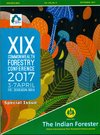Enhancing Carbon Retention through Improved Forest Management
DOI:
https://doi.org/10.36808/if/2017/v143i9/118899Keywords:
Forest Management, Reduced Emission, Carbon Retention, Teak Stands, Tropical Region.Abstract
Most of the discussions of Reduced Emissions due to Deforestation and Degradation (REDD) focus on tropical deforestation, however, the potential carbon saving from reduced forest degradation is mostly disregarded. This costeffective approach to mitigation needs be included in the new climate change agreement. The potential global contribution of improved tropical forest management to carbon retention is substantial. To assess the effect of silvicultural management on the yield and carbon sequestration, a study was conducted in two teak sample plots (thinned and unthinned) established in Koppa Forest division of Karnataka in India. Both the plots were nearby and of similar age. The volume yield and above-ground stored carbon was found to be about three times more in silviculturally managed (thinned) forest stand compared to un-managed (un-thinned) stand. In this paper, the role of improved forest management for carbon retention is highlighted. The silviculturally managed forest stands sequester significantly more carbon compared to un-managed forest stand. Incentives to retain more forest carbon through improved management would represent a big step toward sustainability in the vast area of tropical forests outside protected sites.References
Asner G.P., Knapp D.E., Broadbent E.N., Oliveira P.J.C., Keller M. and Silvas J.N. (2005). Selective logging in the Brazilian Amazon. Science, 310: 480-482.
da Fonseca G.A.B., Rodriguez C.M., Midgley G., Busch J., Hannah L. and Mittermeier R.A. (2007). No forest left behind. PLoS Biology, 5(8):e216.
Gullison R.E., Frumhoff P.C., Canadell J.G., Field C.B., Nepstad D.C., Hayhoe K., Avissar R., Curran L.M., Friedlingstein P., Jones C.D. and Nobre C. (2007). Tropical forests and climate policy. Science, 316: 985-986.
Hubert N. and Courrand R. (1988). Poda y formación de los árboles forestales. Edición Española (Madrid, 1989), traducido de edición francesa. Institut pour le Développement Forestier, Francia, 300 pp.
ITTO (2006). Status of tropical forest management 2005. ITTO Technical Series No. 24. International Tropical Timber Organization (ITTO), Yokohama, Japan, 305 p.
Keller M.K., Asner G.P., Silva N. and Palace M. (2004). Sustainability of selective logging of upland forests in the Brazilian Amazon: Carbon budgets and remote sensing as tools for evaluating logging effects. In:, Working forests in the Neotropics. Zarin, (D.J., Alavalapati, J.R.R., Putz, F.E. and Schmink, M. eds.) Columbia, New York, pp. 41-63.
Marklund L.G. and Schoene D. (2006). Global forest resources Assessment 2005: Global assessment of growing stock, biomass and carbon stock. Forestry Department, FAO, Rome. FRA Working paper 106/E, 55 pp.
Nepstad D.C., Verissimo A., Alencar A., Nobre C., Limaet E., Lefebvre P.A., Schlesinger P., Potter C., de S. Moutinho P.R., Mendoza E., Cochrane M.A. and Brooks V. (1999). Large-scale impoverishment of Amazonian forests by logging and fire. Nature, 398: 505-508.
Pérez D. (2005). Stand growth scenarios for Tectona grandis plantations in Costa Rica. Dissertationes Forestales. Faculty of Agriculture and Forestry, University of Helsinki, Finland, 77 pp.
Pinard M.A. and Cropper W.P. (2000). Simulated effects of logging on carbon storage in dipterocarp forest. J. Applied Ecology, 37: 267-283.
Pinard M.A. and Putz F.E. (1996). Retaining forest biomass by reducing logging damage. Biotropica, 172: 278-295.
Putz F.E., Zuidema P.A., Pinard M.A., Boot R.G.A., Sayer J.A., Sheil D., Sist P., Elias and Vanclay J.K. (2008). Improved tropical forest management for carbon retention. PLoS Biology, 6(7):e166.
White A. and Martin A. (2002). Who owns the world's forests? Forest tenure and public forests in transition. Forest Trends, Washington D.C.
Downloads
Downloads
Published
How to Cite
Issue
Section
License
Unless otherwise stated, copyright or similar rights in all materials presented on the site, including graphical images, are owned by Indian Forester.





